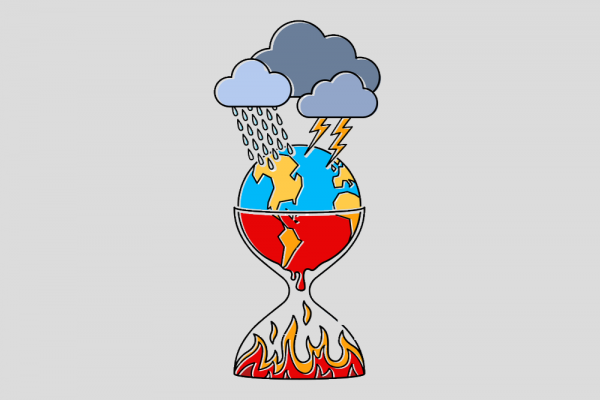Earlier this month, Pope Francis, Ecumenical Patriarch Bartholomew, and the Archbishop Justin Welby of Canterbury — leaders of the world’s three largest Christian bodies — released a joint statement on climate change. These leaders represent churches whose shared membership includes an estimated 20 percent of the world’s population. Though Patriarch Bartholomew and Pope Francis have offered invaluable leadership on this issue for years, the three leaders have never issued a joint statement before. Their voices matter.
But their statement, released just before world leaders gather at the U.N. Climate Change Conference (COP26) to debate steps to combat the climate crisis, failed to specify who is truly responsible for the climate emergency and what really must change. This is a lost opportunity. The world needs religious voices that clearly name the causes of this dire crisis, articulate a moral vision, and catalyze courageous action to meet the suffering that lies ahead while bending history’s arc towards justice.
Here are three things religious leaders absolutely must do when they are preaching, speaking, and writing about climate change.
First, clergy need to name what is creating this problem. We face a climate emergency because the fossil fuel industry has put its own profits above the well-being of people and planet; used tobacco industry-like marketing tactics to deceive the public; lobbied and spent massive sums to block change; and systematically targeted vulnerable communities that bear the brunt of coal, oil, and gas operations. Industrial agriculture, responsible for massive deforestation and violating Indigenous rights, is also to blame. Governments have outright supported the destruction or played both sides of the fence. Banks and asset managers are still bankrolling the problem. These enormous institutions, with their massive wealth and power, far surpass other causes of the climate crisis. They must be held accountable and change. To suggest otherwise or to avoid mentioning this is, to use an old religious phrase, a sin of omission.
For religious leaders, this means avoiding saying things like, “We must be good stewards of Creation” or “Our faith teaches us to protect the Earth” and instead getting comfortable saying things like: “ExxonMobil, BP, Shell, and other oil and gas companies are systematically destroying the planet — and financial giants like JPMorgan Chase, Bank of America, Wells Fargo, BlackRock, and Vanguard are bankrolling the destruction.” Faith leaders also need to call out those responsible by name, saying things like: “President Joe Biden, while he’s taken some important steps forward, is refusing to block new fossil fuel pipelines while the Republican party’s leaders call climate change a hoax.” When describing the actions of these leaders and institutions, we must use some of the strongest language in our moral vocabulary, words like “shameful,” “deadly,” and “morally abhorrent.” We must make it clear that these companies, their shareholders, our government, and those working for these institutions must change.
Second, religious leaders must articulate specific criteria by which all climate action, including COP26, must be measured, especially criteria that the political sector is not yet able to address. GreenFaith International Network, the global, multi-faith, grassroots coalition that I help lead, modeled how to make specific demands this past March. Our demands included an immediate end to new fossil fuel projects, deforestation, related financing; continued fossil fuel divestment; a generous welcome for climate refugees; funds for developing countries from the nations responsible for the lion’s share of historic emissions; access to renewable energy for absolutely every person, especially the 840 million people living without electricity; a massive green jobs commitment to rebuild the infrastructure of human civilization; a just transition for impacted workers and communities; and enforcement of Indigenous rights.
These demands are ambitious — and politically fraught. But they are the foundation of a truly moral response to the crisis. Naming them is exactly what religious leaders must do, as part of broader civil society efforts to force politicians and business leaders to deal with these tough issues. Our faiths call for nothing less.
Third, religious speech on climate change must challenge and galvanize with depth and power. Faith leaders must directly address the misery and suffering that climate change is causing and will cause, and demand compassionate responses. We must name the evil that perpetuates this grave threat, evoking an unyielding thirst for justice. We must release moral passion that inspires people to get up from their pews, prayer rugs, and meditation cushions and to go into the streets and voting booths en masse — because this is what changes history.
Too often, I hear preachers say that climate issues are political, difficult to address, or potentially divisive. Too often, I see religious leaders, including the aforementioned Pope-Patriarch-Archbishop statement, using diplomatic terms about climate change, as if the goal is not to upset anyone. Too often, I see clergy relying solely on theological concepts while failing to name the specific, well-known causes and moral villains behind the climate emergency — or suggesting that individuals bear as much responsibility as governments and fossil fuel companies for the danger we’re now in.
This kind of religious equivocation is wrong, particularly at this eleventh-hour moment. If you find yourself tempted by any of these tension-avoidance mechanisms, there is no way to sugarcoat it: Decide whether your comfort, and the comfort of some members of your congregation, are more important than countless human lives. This is not a time for preachers to play it safe; it is time for prophetic thunder. The well-being of billions of people and the planet’s future hang in the balance. For God’s sake, do not blow this opportunity.
On Oct. 17 and 18, grassroots people of diverse religions around the world are organizing a public climate action — Faiths 4 Climate Justice — that embodies the substance of what’s called for above. People of faith everywhere should get involved and remind the world that religious communities can speak with specificity and moral clarity about the grave threat we face. Our congregants and the world need moral clarity on climate change now; let’s show that we can bring it.
Got something to say about what you're reading? We value your feedback!







